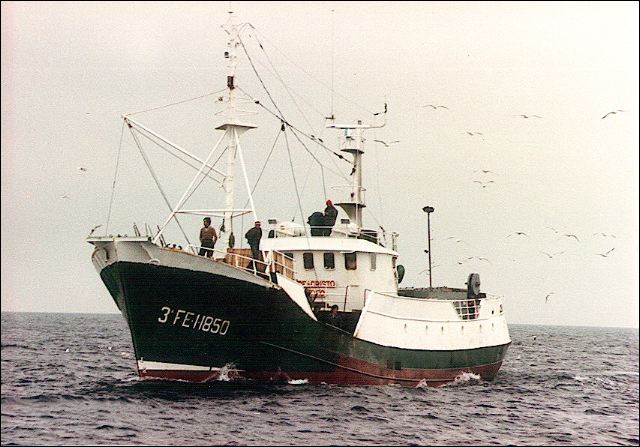Typical Spanish fishing vessel
Fishing boats belonging to each company were involved in the £540,000 fiddle, which included lying in logbooks and landing declarations, and transferring catches between vessels. Prosecutors had argued the firms should pay £2.7 million, but Judge Graham Cottle said he did not want to drive them out of business. Between them they were ordered to pay a confiscation order of £925,000 and a £500,000 fine, while the £195,000 court costs were also ordered to be split.
The two skippers involved were each ordered to pay fines of £5,000. Judge Cottle described the operation as “a systematic, repeated and cynical” abuse of EU fishing quotas and labelled it “sophisticated”. He said: “This was a serious breach of EU fishing regulations. It involved the flagrant, repeated and long-term abuse of regulations carried out by the masters of both vessels with the full knowledge, complicity and direction of the Spanish-registered companies. It involved targeting hake – what was certainly at that time a seriously endangered species. “Substantial profit ensued. It was sophisticated in the particular sense that transshipping [shifting catches between vessels] was a feature.”
The firms, their owners and skippers found themselves in front of the courts after their criminal activities came to light in July 2010 after plundering stocks in Scottish and Irish waters before landing hauls in Spain and the UK. HMS Tyne was patrolling off the coast of the Isles of Scilly when officers made a routine check of the Coyo Tercero owned by Hijos De Vidal Bandin SA. They discovered a concealed stash of salted ling weighing 574kg which had not been entered into the logbook. It sparked an investigation by the Marine Management Organisation (MMO), which found that skipper Jose Antonio Perez Garcia, 42, lied in logbooks. Entries in the document pointed to a second boat, the O’Genita owned by Sealskill Limited and skippered by Jose Manuel Martinez Sanchez, 40.
Using satellite technology, the MMO learned that catches of hake had passed from one vessel to the other, which is illegal, and no note had been made in logbooks. Manuel Vidal Suarez, 64, and Maria Dolores Vidal Marino, 40, were company directors of Hijos De Vidal Bandin SA and Sealskill Limited respectively. At a previous hearing, the four entered pleas to nine counts from between August 2008 and August 2010. Suarez and Marino entered pleas on behalf of their firms and for themselves. Both skippers and companies pleaded guilty to all of the charges relating to falsifying logbooks and shifting fish between boats.
The owners and skippers entered not guilty pleas to a string of fraud and theft charges. Suarez and Marino denied the offences. Their pleas were accepted by the Crown. Brian Lett, QC, defending all the defendants, said they were considering appealing. After the hearing, Danny Poulding, senior investigating officer for the MMO said it was the highest court order amount ever imposed in a fisheries case brought by them. He said: “This company systematically abused the quota system for significant and unfair financial gain, threatening the future sustainability of an already vulnerable fish stock and impacting on the businesses of legitimate fishermen by flooding the market with cheaper fish. “The majority of the fishing industry is compliant with the rules that govern its commercial activities, but we will ensure that those who aren’t do not enjoy unfair financial advantage from illegal sales.”
Paul Trebilcock, chief executive of the Cornish Fish Producers Organisation, said the fine sent a clear message to those bent on breaking the rules. “Here in the UK we have had a rigorously enforced fishing regime for years and years with satellite technology, electronic logbooks and other measures. All we want is a level playing field and consistency.” Jim Porteous, of the South West Fisheries Producers Organisation, said while foreign firms were allowed to operate under the British flag, flouting of rules would continue. He said: “Quota hopping has been going on since 1977 and will continue unless the rules change. The British Government tried to take Europe on over this but lost. It demonstrates we are subservient to European law. It’s sad we can’t properly protect our fish stocks.”
Courtesy of ThisisCornwall
